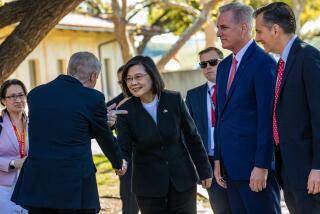ASIA : Mile-High China-Taiwan Barrier Falls : A direct air link between the enemies--with a pit stop in tiny Macao--could augur more ties.
- Share via
MACAO — Early next month, an airliner will take off from Chiang Kai-shek International Airport in Taiwan and fly to the new airport in this tiny Portuguese outpost on the South China Sea.
The Air Macau Airbus 321 jetliner will pause for 30 minutes on the tarmac of the Macao airport and acquire a new flight number. But most of the passengers--mainly Taiwanese business people--will remain on board. Then the aircraft will take off for Beijing, the capital of China.
To someone unfamiliar with the complexity of East Asian politics, this might seem a rather routine moment in international aviation and commerce.
In fact, the inaugural Taipei-Macao-Beijing flight by the fledgling Air Macau airline marks a historic change: the first direct air link between Taiwan and the People’s Republic of China in nearly half a century.
Politically, it means that one of the last major barriers dividing the Chinese Communists and the Taiwanese Nationalists is breaking down. Under its Guidelines for National Unification, Taiwan has banned direct air links with China since 1949, when the Nationalists under Chiang Kai-shek were driven from the mainland to Taiwan by the Communists.
But now, not only has Taiwan agreed to allow the direct flights (with the small fiction of a change in flight numbers), but it is doing so with an airline that is under the direct control of the once-despised Communists. China National Aviation Corp., a wholly owned subsidiary of China’s Civil Aviation Administration, owns 51% of Air Macau.
Moreover, the two nations may open full air and sea transportation links sometime between 1997 and 1999, a senior Taiwanese official, Transport and Communication Minister Liu Chao-shihuan, said in a speech recently.
Until now, all Taiwanese traffic to the mainland--including more than 2 million Taiwanese travelers--had to pass through Hong Kong or another country and change aircraft before entering China.
The shift in Taiwan’s policies is mainly the result of pressure from businesses operating on the mainland.
As Taiwanese industry continues to move its manufacturing base to the mainland, several Taiwanese air carriers and shipping companies have lobbied for direct transportation links. Other air carriers, including Hong Kong-based Cathay Pacific and Dragon Air, are hoping to establish direct connections to the mainland following the “Taiwan-Macao Model.”
*
For tiny Macao (the airline uses the Portuguese rather than the English spelling) and its new $1-billion airport, the new air service promises a potential economic windfall of several hundred million dollars annually.
According to Air Macau’s chief executive, Ng Kian-wah, the first Taiwan-Macao-Beijing direct flight will take off Dec. 8. By April, Ng said, Air Macau will be operating 49 flights a week from two Taiwanese cities (Taipei and Kaohsiung) to Macao and on to Beijing, Shanghai and Xiamen on the mainland. The goal, ambitious for an airline that so far has only one plane, is to carry 650,000 Taiwanese passengers a year.
For neighboring Hong Kong, it signals an end to its long and lucrative dominance of Taiwanese transit travel to China. According to the Hong Kong Tourist Assn., nearly 1.2 million Taiwanese visited Hong Kong between January and August; only China sent more travelers.
The Taiwanese spend more than $2 billion in Hong Kong annually for air fares, hotels, entertainment and meals. The per capita expenditure for the Taiwanese ($1,204 per visit) is more than for other nationalities, including Americans ($884) and Japanese ($1,082).
Tiny Macao, which until the airport opening Thursday had no air service except helicopters and seaplanes, hopes to capture up to one-third of this Taiwanese business from Hong Kong.
Macao gambling tycoon Stanley Ho, who owns 5% of Air Macau and whose daughter sits on the airline’s board of directors, is no doubt also hoping that some of the travelers make a pit stop in one of his casinos in the territory.
To Taiwanese business people, who have long chafed at the inconvenient Hong Kong stopover, the advantages are obvious. Macao, unlike Hong Kong, requires no visa for Taiwanese. By traveling via Macao, the executives save money and time. For the first time, their bags can be checked in Taipei and arrive in China without being shuffled between planes.
“I can’t tell you how much money--tens of thousands of dollars--I’ve had to spend traveling from Taiwan through Hong Kong,” Taiwanese businessman Chen Chien-nan said.
(BEGIN TEXT OF INFOBOX / INFOGRAPHIC)
Macao Airport
By opening the first direct air link between Taiwan and China, tiny Macao and the fledgling airline Air Macau hope to eventually snare one-third of the lucrative $2-billion Taiwan-China transit/tourist market now dominated by Hong Kong.
Taiwan accounts for 20% of all visitors to Hong Kong, more than any other country except China.
Visitors to Hong Kong by country (Jan.-Aug., 1995)
China: 1,438,668
Taiwan: 1,199,170
Japan: 1,016,640
U.S.: 483,706
S. Korea: 235,529
Britain: 229,901
Total visitor spending in Hong Kong by country (Jan.-June, 1995)
In millions of U.S. dollars
Taiwan: $1,011
China: $852
Japan: $767
U.S.: $324
Phil.: $132
Britain: $128
Source: Hong Kong Tourist Assn.
More to Read
Sign up for Essential California
The most important California stories and recommendations in your inbox every morning.
You may occasionally receive promotional content from the Los Angeles Times.











